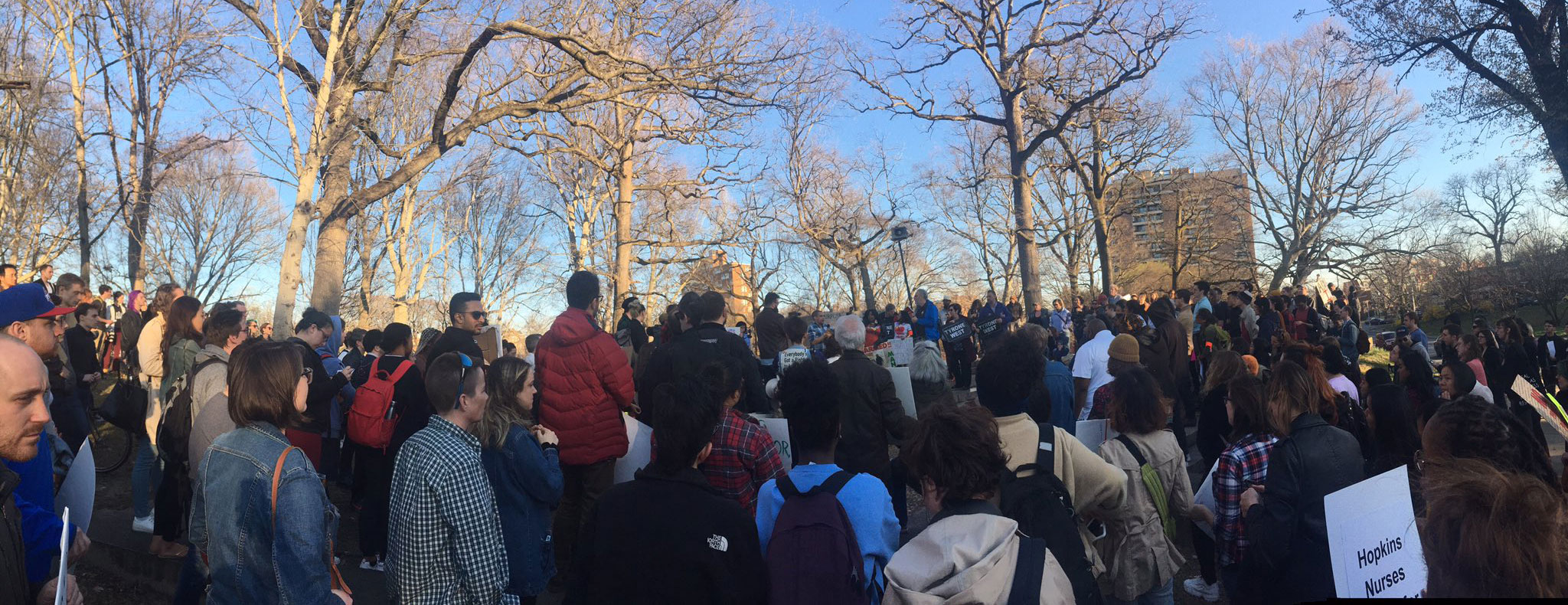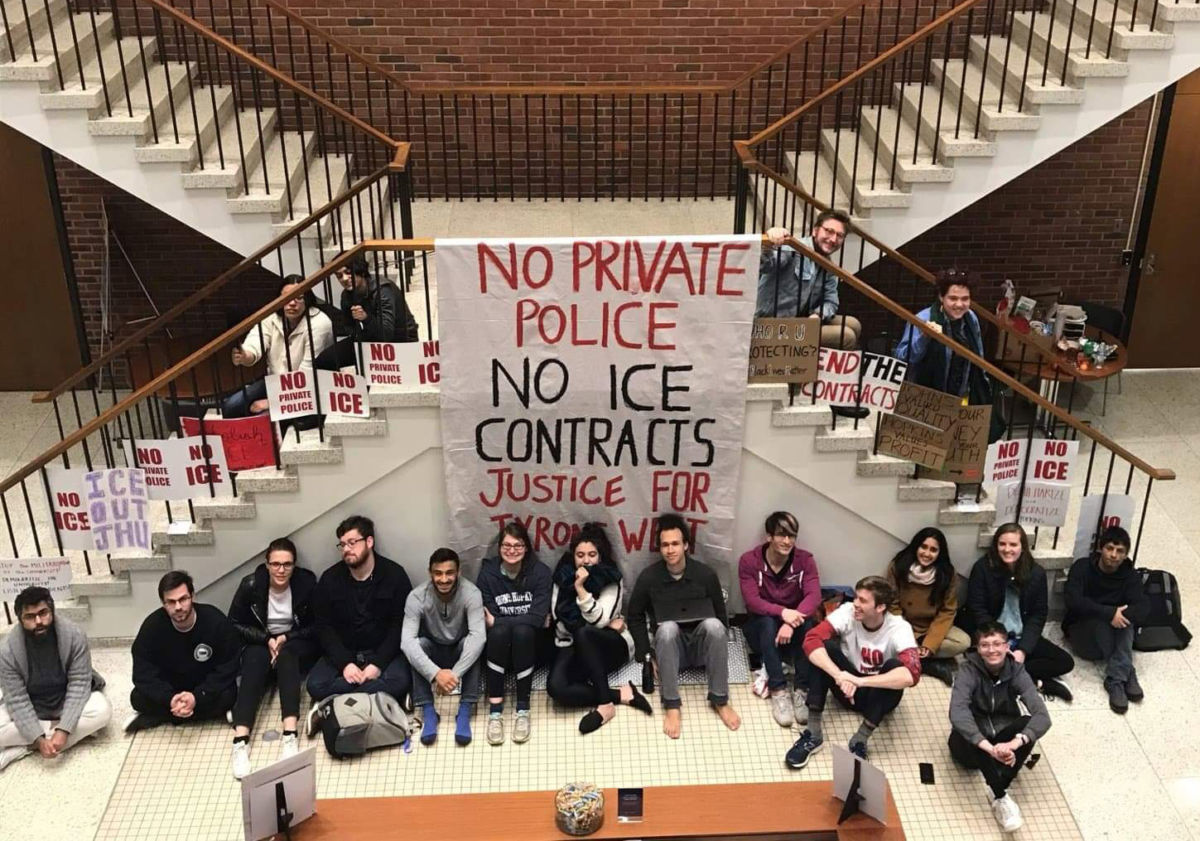Honest, paywall-free news is rare. Please support our boldly independent journalism with a donation of any size.
Students at Johns Hopkins University — joined by neighborhood groups, workers’ unions and left-leaning advocacy organizations — are currently occupying the university administration building on campus, demanding an immediate end to the university’s push for an armed private police force and its contracts with Immigration and Customs Enforcement (ICE).
The sit-in — which started at 1 pm on Wednesday, April 3 — is part of a broader set of community protests organized in response to the Maryland State General Assembly’s decision earlier this week to approve a law allowing Johns Hopkins to create its own armed private police department, complete with arrest powers and state protections. This marks the first time that a private institution in Maryland will have the authority to use force and make arrests through a privately owned and controlled police force.
As activists involved in the sit-in, we are writing from inside the building occupation to spread awareness that, while an armed private police force is new to the state, this type of militarization is the modus operandi for our university. Johns Hopkins has long been one of the Defense Department’s largest academic contractors, engineering some of the U.S. military’s deadliest weapons through its Orwellian “Applied Physics Lab.”
Moreover, student activists discovered recently that Johns Hopkins has been profiting from lucrative contracts with ICE — the brutal organization responsible for violent detention and deportation of immigrants across the country — to the tune of millions of dollars for medical and leadership training of enforcement officers.
Johns Hopkins is pushing this militaristic expansion of its operations despite massive resistance from university students, faculty members, workers and neighbors. Even before this week’s actions, Hopkins students and the local immigrant rights community joined together to hold one of the largest walkouts in university history and delivered a petition with more than 2,000 signatures to end the ICE contracts.
According to the university Student Government Association’s referendum, 75 percent of undergraduates oppose the private police force. More than 2,800 affiliates and neighborhood residents signed a petition against it. Students Against Private Police joined Leaders of a Beautiful Struggle, the NAACP, the American Civil Liberties Union, UNITE HERE Local 7 and Services Employees International Union 1199 to testify in opposition over multiple days at the Maryland General Assembly.
A plurality of adjacent neighborhood associations voted against the bill. Nearly 130 faculty members — including almost every Black faculty member at the Krieger School of Arts and Sciences — penned a letter calling the university’s conduct in promoting a private police force “undemocratic.”
The moral vacuity of contracts with a violent organization like ICE is clear to many observers. But the push for an armed private police force is equally dangerous for our communities. University administrators claim this push is based in a concern for safety and security — but whose safety matters to Johns Hopkins? Their statements consistently point to the protection of university affiliates from the majority Black (and often poor) residents of Baltimore whom are automatically deemed “dangerous.” But this doesn’t match the reality of the situation; this year, crime has declined around the main Johns Hopkins campus, and the most prevalent and destructive crime against students at this university is perpetrated by other students: sexual assault. The university has consistently failed to address sexual assaults, underestimating the number of cases and — in one instance — losing track of multiple complaints in a computer error.
Our neighbors throughout Baltimore have good reason to be concerned about whose safety matters to the institution. At the University of Pennsylvania and the University of Chicago — which Johns Hopkins cites as its model police forces — the private police officers often violate constitutional liberties and provide an enforcement arm in university-led gentrification. Reports of racial profiling and abuses of power are legion, and last year, university police shot a University of Chicago student undergoing a mental health episode.
This is what administrators are bringing to our university.
Johns Hopkins’s push for control over the means of state violence comes at a moment of crisis for the City of Baltimore. Faith in the Baltimore Police Department — long understood to be one of the most racist and brutal forces in the country — is at an all-time low following the murder of Freddie Gray in 2015. We’ve had four police commissioners in three years. Moreover, the university administration repeatedly points to the close relationship a potential John Hopkins University Police Department will have with the Baltimore Police Department — Johns Hopkins has hired Melissa Hyatt, a former lieutenant in the Baltimore Police, to be the new university police chief, and a memorandum of understanding between the John Hopkins University Police Department and Baltimore Police Department will govern the university police force’s conduct and operation.
But Baltimore’s political crisis extends beyond the Baltimore Police. The mayor, Catherine Pugh, was pressured into an indefinite leave this week following a corruption scandal in which she “sold” her children’s books to local hospital systems for hundreds of thousands of dollars — while she was on the board of one of the hospitals and overseeing legislation and contracts with others. Pugh’s scandal doesn’t stop at children’s books. She’s been implicated in shady dealings surrounding this private police force authorization bill: Days before she requested the bill for the private police force to be sponsored (on behalf of the university), she received $16,000 in campaign donations from nine members of the upper university administration — coordinated on the same day.
That’s why the thousands of Johns Hopkins affiliates represented by Students Against Private Police, Hopkins Coalition Against ICE, Teachers and Researchers United, Hopkins Students for a Democratic Society, JHToo, Hopkins Socialists, the Black Student Union, and National Nurses United (Mid-Atlantic Region, NNOC/NNU) have come together in these joint actions this week.

We believe in a democratic and demilitarized university. We refuse to allow our university administration to take these dangerous actions in our names any longer.
This struggle in Baltimore is just one example of a much larger trend toward the militarization of universities across the country. This has taken shape in form of armed private police forces — like those at University of Chicago, University of Pennsylvania, Massachusetts Institute of Technology and Harvard — as well as contracts with ICE — like those at Northeastern, University of Maryland, University of Alabama and Vermont State Colleges. In each of these cases, students have joined together with their communities to fight back against this dangerous trend.
As we look toward day three of our sit-in here at Johns Hopkins, we are drawing inspiration from these fights against the militarization of institutions of higher education. Lastly, as U.S. universities become increasingly more lethal for their members and neighbors, we seek to catalyze a new wave of university protests. As affiliates of these universities, it is our moral obligation to reduce the harm they cause in our communities. We’re sitting-in — and we’re just getting comfortable.
Media that fights fascism
Truthout is funded almost entirely by readers — that’s why we can speak truth to power and cut against the mainstream narrative. But independent journalists at Truthout face mounting political repression under Trump.
We rely on your support to survive McCarthyist censorship. Please make a tax-deductible one-time or monthly donation.
